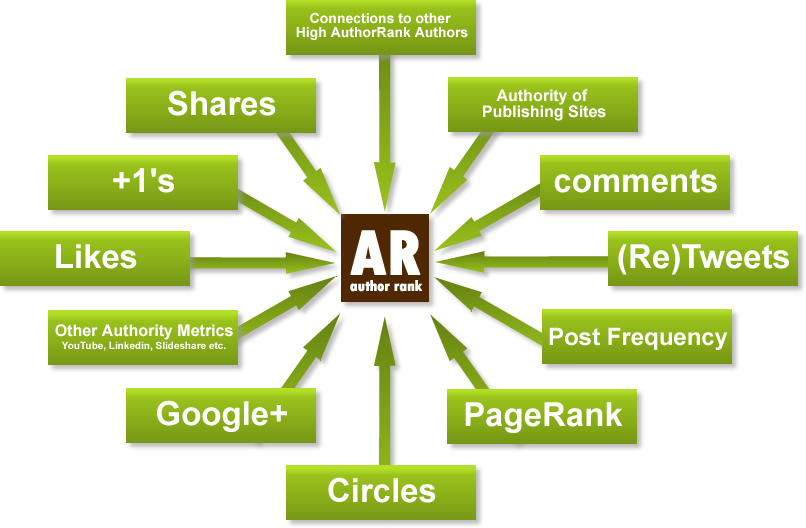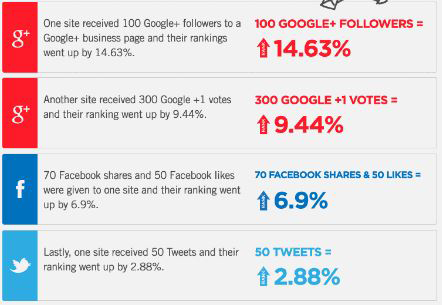Do Facebook Social Signals Influence SEO?
This subject has an unnecessary amount of controversy. I believe the answer is black and white, but others are trying to paint all social signals as worthless because of a 2014 Matt Cutts video that said a few were worthless. There are many things going when you’re talking about social signals. For the sake of simplicity, let’s just talk about Facebook and Twitter. You have likes and favorites, retweets and shares, and links — and on top of all this you have how many followers each account has. These are all social signals, all things that can happen on a social media account. They are distinct from each other.
Matt Cutts said some important things about Facebook and Twitter links in a 2010 video. The title of the video is “Does Google use data from social sites in ranking?” The specific question asked was “Hello Matt, a recent article of Danny Sullivan suggests that Google uses Twitter and Facebook links as a ranking signal. Can you confirm this? Can you elaborate a little more on this?” In response to this question, Matt made some interesting comments. Matt’s response:
Yes, I can confirm this, we do use Twitter and Facebook links in ranking, as we always have in our websearch rankings, but in addition we’re also trying to figure out a little bit about the reputation of an author or a creator on Twitter or Facebook. And let me just give you a little bit of a background on that. I filmed a video on that back in May, 2010, where I said that we didn’tuse that as a signal, and at the time we did not use that as a signal, but now we’re taping this in December 2010, and we are using that as a signal. … In the same way that pagerank depends not on just the number of links, but the quality of those links, you have to think about what are the followers who mean quality, the people who actually are not just bots you know, or some software program, or things like that.
Here we have Matt Cutts, in December of 2010, saying that they do use Twitter and Facebook links as a ranking signal, and that they attempt to decide who is important socially, to give the most popular types of accounts the strongest weighting as far as how much benefit their links will help a page to rank.
So far, it’s pretty straight forward. There is no controversy yet — social links absolutely help when they are made by Facebook accounts that have a higher social standing, higher quality signals and those accounts are seen as authorities in their sphere of influence. Let’s now add a layer of controversy.
In January of 2014, we have an article from Search Engine Watch that states that Facebook and Twitter social signals are not a part of Google’s search ranking algorithm. This would seem to completely contradict the 2010 video from Matt. Let’s delve into this 2014 article and see exactly what it is talking about, and whether it negates things that were discussed before.

But as far as doing special, specific work to sort of say, “Oh, you have this many followers on Twitter, or this many likes on Facebook, to the best of my knowledge, we don’t currently have a signals like that in our websearch ranking algorithms.
The first article was about links. The second video was about likes (Facebook) and favorites (Twitter), or how many followers an account has. These are all extremely easy to be manipulated (likes/favorites/followers). You can buy them all. None of these convey relevancy. Google is a master of links, and this 2014 video was not talking about links.
What did Google say previously? They decide how authoritative an author is. How do that do that? With links. People’s Facebook and Twitter accounts get links, links from their own website, links from a tweet getting embedded into an article, this is how Google decides on an account’s relevancy and authority — with links. Google said, in the 2014 video, that they’re not considering likes, favorites and followers. Fair enough! It makes sense. Google cannot determine whether your 1000 favorites were made from quality accounts, or were simply purchased. Google may also have a hard time telling whether your 10k followers are real or purchased. These are all extremely easy to manipulate. Google has decided to stick to the links, which makes sense.
When it comes to links, which things still count? A facebook share often contains a link. A twitter retweet often contains a link. Then there are the direct links that were discussed in the 2010 article. All of these have always been extremely important and still matter, when coming from credible accounts. Likes/favorites and followers are not. That’s all the 2014 video was saying.
There are ways for Google to decide about author rank without judging likes, favorites and followers. For instance, if a website is tied to a Facebook or Twitter account, then Google can decide on the author rank and credit to attribute particular Facebook or Twitter links based on the association with that website, and not how many likes/favorites a site has received. Tweets get embedded into articles, those are links that empower a Twitter account, and the same with Facebook embedded posts. If Google already has a wealth of author information about an individual, and a Facebook or Twitter account is determined to be owned by that individual, then that social media account conveys the authority of that author. Any retweet they do, any share they do, any direct linking conveys a very strong ranking signal.
This 2014 article from Search Engine Land is completely (wrongly) discrediting every signal a social media account can pass along, even though Matt Cutts was only discrediting how many likes or followers a particular account or website has. Likes, favorites and followers can and are exploited. The conclusion then is that a website receiving likes and favorites may (or may not) be receiving any additional boost, however, a page that gets shared, tweeted or retweeted, or direct links from social media accounts, is receiving a positive ranking signal, if Google determined that social account that shared or linked is credible.
 Another thing to point out is that there was a May article in 2010 that did not use social links, and then again in December of 2014, Google did use social links. Google’s algorithm changes over time. The article that said that Google doesn’t use likes and favorites was dated 2014. That is ancient history in terms of Google’s algorithms. They very well could be using likes and tweets today.
Another thing to point out is that there was a May article in 2010 that did not use social links, and then again in December of 2014, Google did use social links. Google’s algorithm changes over time. The article that said that Google doesn’t use likes and favorites was dated 2014. That is ancient history in terms of Google’s algorithms. They very well could be using likes and tweets today.
It serves the purpose of Google to limit exploitation of aspects of their algorithm. The cat is already out of the bag on links, but think how many headaches that Google could have avoided if the association between getting links and ranking was never made. They wouldn’t have even needed a webspam team then! Now they’re facing the same issue of spam when it come to social signals — and it serves Google’s purpose to deny that they are beneficial. By denying they are beneficial, they are not exploited as much, and therefore are a more quality source of ranking information. If Google were to say that likes and favorites actually matter to the ranking algorithm, everyone would rush out to buy fake likes and fake favorites, and this is something that Google wants to avoid, lest their pristine source of ranking information becomes clouded with spam.
In summary, social signals absolutely matter, when that social signal is a link from Facebook or Twitter, or a Twitter retweet, or a Facebook share, from a high quality and authoritative profiles. Likes and favorites may not matter, or perhaps they do. Google cannot distinguish whether your 1000 likes are from credible accounts, or fake accounts, so it only makes sense that Google would not use that data. However, building up a credible Facebook profile, for the purpose of linking to your website — absolutely will help your rankings, as Google comes to the conclusion that it is a credible Facebook profile.
Another take-away is that buying Facebook likes, or Twitter favorites probably do not influence your rankings (but they may). However, if you receive retweets — and the retweets are from credible Twitter accounts — this likely will help your rankings. The same goes for Facebook shares. Google can make a determination of whether your shares happen from reliable accounts, and assign a credible ranking signal to those.

Comments